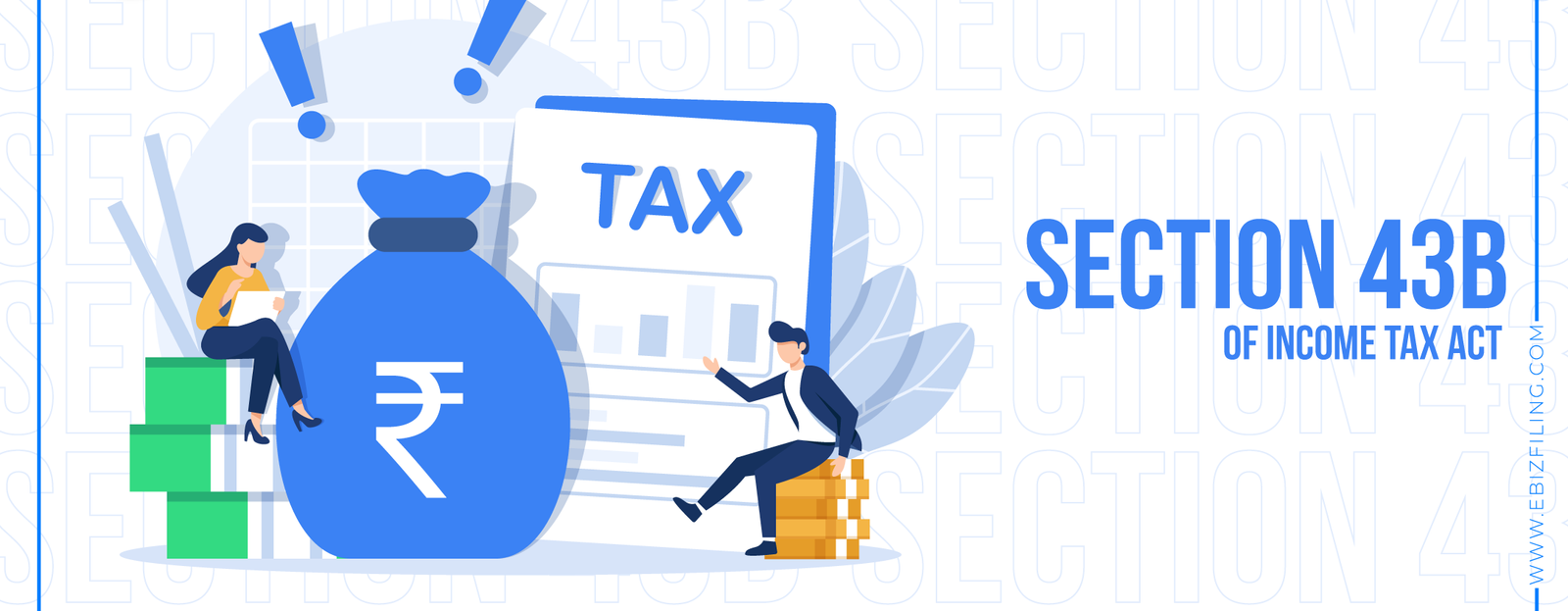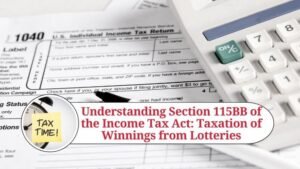Introduction
Section 43B(a) of the Income Tax Act, 1961, is a critical provision that ensures that taxpayers can only claim deductions for certain expenses, including taxes, duties, cess, or fees, when they have actually made the payment. This provision plays a significant role in preventing tax evasion by ensuring that deductions are only allowed for liabilities that have been settled within the prescribed time frame.
Types of Taxes Allowable under Section 43B(a)
When determining whether a specific tax can be claimed as a permissible deduction under Section 37(1) or Section 43B(a), several factors need to be considered. The nature of the business and the nature of the tax are crucial. Generally, if the tax has a direct connection with the operation of the business, it can be claimed as a deductible expense.
Key Court Rulings on Tax Deductibility:
- Strong & Co. of Romsey Ltd. v. Woodifield (1906): This case established that a tax closely linked with the conduct of business can be deductible.
- Travancore Titanium Product Ltd. v. CIT (1966): Affirmed that a tax intimately connected with the business’s functioning is deductible.
- CIT v. Saraswati Industrial Syndicate (1972): Emphasized that taxes directly associated with business operations are deductible.

Specific Inclusions under Section 43B(a)
- Sales Tax: Section 43B applies to sales tax just as it does to any other tax. Sales tax is a compulsory levy and is deductible as a business expense as it is integral to carrying out business activities.
- Relevant Case Law:
- Srikakollu Subba Rao & Co. v. Union of India (1988): Confirmed the applicability of Section 43B to sales tax.
- CIT v. Gujarat Urja Vikas Nigam Ltd. (2010): Extended Section 43B’s applicability to electricity duty payable to the government.
- Relevant Case Law:
- Electricity Duty: The liability for electricity duty, much like other statutory dues, falls under the purview of Section 43B(a) and is only deductible upon actual payment.
- Income Tax on Behalf of Employees: Income tax paid on behalf of employees is not deductible under Section 43B(a) as per rulings such as Flour & Food Ltd. v. CIT (1983).
- Municipal Taxes: The deductibility of municipal taxes, like urban land tax, also falls under Section 43B(a). The liability to pay these taxes accrues when demand notices are served, making it deductible in the relevant year.
- Excise Duty and Customs Duty: These duties are statutory liabilities incurred upon manufacturing or importing goods. The liability becomes deductible under Section 43B only when paid.
- Relevant Case Law:
- Union of India v. Delhi Cloth and General Mills Co. Ltd. (1963): Clarified that the taxable event for excise duty is the manufacture of goods, making it deductible when actually paid.
- CIT v. O.E.N. India Ltd. (2000): Discussed the timing of customs duty deductibility based on when the demand is raised and settled.
- Relevant Case Law:
Amendments and Clarifications
Section 43B was amended by the Finance Act, 1988, to include ‘cess or fee by whatever name called,’ effective from April 1, 1989. This means that the deduction for any such liability is allowed only if the actual payment is made during the relevant period, and this amendment is not retrospective.
Notable Case:
- CIT v. Moti Lal Padampat Udyog Ltd. (2013): The amendment’s prospective application was upheld, reinforcing the principle that deductions under Section 43B(a) are contingent on actual payment.
Practical Implications
For businesses maintaining a mercantile system of accounting, this provision mandates that any liabilities covered under Section 43B(a) can only be claimed as deductions when they are paid, irrespective of whether the liability was accrued during the financial year.
Key Takeaways:
- Section 43B(a) covers various taxes, duties, cesses, and fees that are deductible only upon actual payment.
- The provision prevents the deduction of these liabilities on an accrual basis to curb tax evasion.
- Taxpayers must ensure timely payment of such liabilities within the relevant financial year or before filing the return to claim the deduction.
Frequently Asked Questions (FAQs)
1. What is Section 43B(a) of the Income Tax Act?
Answer: Section 43B(a) mandates that certain expenses, including taxes, duties, cess, or fees, can only be deducted for tax purposes if they are actually paid within the relevant financial year or before filing the return.
2. Which taxes are covered under Section 43B(a)?
Answer: Section 43B(a) covers various statutory liabilities, including sales tax, excise duty, customs duty, electricity duty, municipal taxes, and more.
3. Is sales tax deductible under Section 43B(a)?
Answer: Yes, sales tax is deductible under Section 43B(a) when it is actually paid, regardless of the accrual of the liability.
4. Can income tax paid on behalf of employees be claimed as a deduction under Section 43B(a)?
Answer: No, income tax paid on behalf of employees is not deductible under Section 43B(a).
5. What happens if a liability covered under Section 43B(a) is not paid within the financial year?
Answer: If the liability is not paid within the financial year or before the due date of filing the return, the deduction for that liability cannot be claimed for that year.
6. Does Section 43B(a) apply to all businesses?
Answer: Yes, Section 43B(a) applies to all taxpayers, including individuals, businesses, and other entities who claim deductions for the specified expenses.
For more insights and updates on tax laws, visit Smart Tax Saver.
Conclusion
Section 43B(a) of the Income Tax Act is a vital provision that ensures deductions are only allowed for certain liabilities when they are actually paid. This not only promotes timely payment of statutory dues but also ensures that tax deductions are not claimed on unpaid liabilities. Businesses must carefully monitor and manage their payment of taxes, duties, cess, or fees to ensure compliance with this provision.




